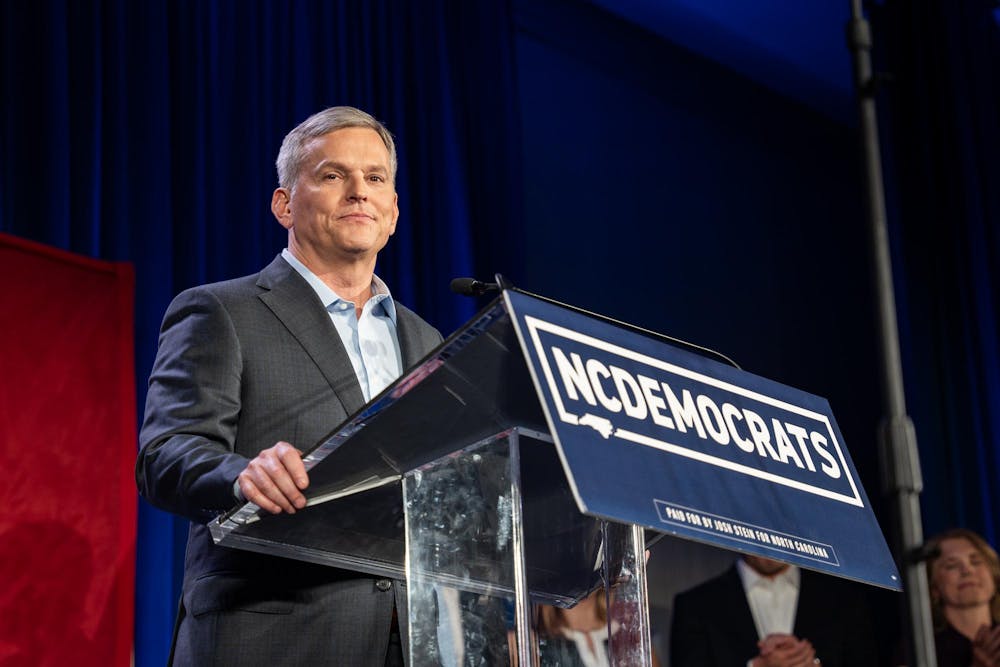Friday marked N.C. Governor Josh Stein’s 100th day in office. In his inaugural speech, Stein highlighted his commitment to spearheading Hurricane Helene relief efforts in Western North Carolina, education reform and, above all, bipartisan collaboration in achieving these policies. To the majority Republican N.C. General Assembly, Stein urged, “I want to stand with you as we fight for our people, not with each other.” These issues remain at the forefront of his agenda, all while his administration silently and steadily navigates a hostile state and federal political landscape.
Stein’s administration has a unique opportunity: to spur political involvement and engagement in the months that span between election seasons. The people of North Carolina are primed to step forward, to care — they have endured the grief of natural disaster and the heightened national spotlight that falls on swing states. The volatility of the current federal administration offers Stein a chance to encourage a real, progressive shift, both in culture and legislation, one that pushes meaningful policy and motivates voters to show up for the midterm elections.
Active messaging and aggressive policy-making are reasonable first steps for such a movement. In his “honeymoon” stage of governance, issues like education reform should be at the forefront of the ticket — in a manner that refuses to capitulate to conservative majorities who have all but advocated for the resegregation of schools with private school voucher systems. This resistance could be trendsetting for the rest of the national Democratic Party, setting a precedent of change and action that is all but lackluster at the current federal level.
Stein has made good on his promise to prioritize recovery efforts in Western North Carolina, signing the Disaster Recovery Act of 2025 into law in March. However, as the only bill signed into law in his over three months in office, most of Stein’s moves have been more symbolic than concrete. Yet, there is value to be found in efforts like the governor’s 2025-2027 budget proposal, setting the tone for economic, education and health policy that prioritizes North Carolinians’ well-being in a period defined by the state’s resilience.
Anxieties about losing precious Democratic seats in the General Assembly and reviving a Republican supermajority may understandably rattle Stein’s resolve to champion progressive policies and oppose federal antagonism. However, other Democratic governors like Michigan’s Gretchen Whitmer have shown great success with fearlessly pushing state interests in the face of Republican retaliation.
When Whitmer was the subject of a revealed kidnapping plot by far-right domestic terrorists, she capitalized on the near-tragedy by rebuking political violence and championing state citizens welfare. Whitmer’s time in office has been incredibly productive; she's ensured abortion protections, expanded access to free school meals and strengthened protections for her state’s LGBTQ+ community, landing her a 52 percent approval rating. North Carolina deserves a similarly driven leader.
This is not to say that Stein’s performance thus far has been in any way substandard. 100 days is an early benchmark, and in a state where voters have repeatedly rewarded quiet, steady leadership, no news is good news. It’s also worth noting that he’s in a precarious position, walking a delicate line between the dysfunction at the federal level and a still-hostile state legislature. Still, the current political climate provides Stein with an invaluable opportunity — to use his appeal as a platform for progressive policy, showing up for North Carolina without alienating its political center.
Voters here don’t want chaos, but they do want clarity. In an era as tumultuous as this one — when constituents worry for the survival of Medicaid and federal funding — Governor Stein can offer North Carolinians active stability and governance, and stand even taller on the national stage as a result.




